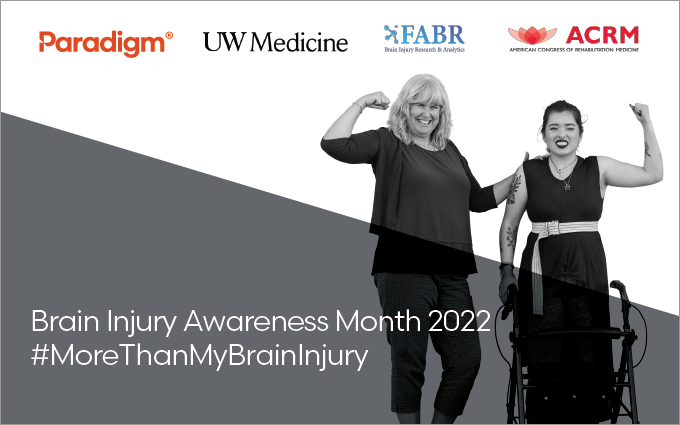03/03/2022

The Brain Injury Association of America observes Brain Injury Awareness Month every March to increase education and assistance for traumatic brain injuries (TBIs). Workplace injuries contribute to a range of TBIs, and a significant percentage of brain-injured workers suffer very severe and permanent brain impairments that negatively impact their quality of life. By taking steps to increase prevention and staying up to date on emerging novel treatments of TBIs of any type, Paradigm is proud to support Brain Injury Awareness Month each year.
The Paradigm Systematic Care ManagementSM model leverages innovations in catastrophic brain injury care to ensure the most optimal recovery of injured workers in workers’ compensation. In efforts to best manage the care for our most severely injured workers with TBIs, we continue to foster close relationships with leading clinical research groups in this field of brain injury study. New technology and innovations made possible through brain injury research, including advanced TBI biomarkers using blood testing and imaging studies, have increased the potential for earlier and more accurate diagnoses.
In addition to increasing our access to the latest advances in brain injury medicine, clinical partnerships also enable Paradigm to contribute clinical knowledge, data, and expertise back to this sector. Michael Choo, MD, Paradigm’s Chief Medical Officer, is a key representative and stakeholder for our clinical partnerships in TBI research.
As we recognize Brain Injury Awareness Month, here is the latest on our ongoing support for and collaboration within this important clinical research area.
Sharing the latest research to advance workers’ compensation brain injury care
Paradigm partnered closely with the American Congress of Rehabilitation Medicine (ACRM) to co-fund, create, and release clinical guidelines and systematic reviews for rehabilitative medicine, which includes TBI care. Dr. Choo is currently the chair for the ACRM Dissemination & Policy Committee, and serves as a brain injury task member. One of the newest publications Paradigm has fully supported is the clinical guidelines as well as minimal competency standards specific to providers with Disorders of Consciousness (DoC) programs throughout the US. In addition, in the near future, Paradigm and ACRM will be making available to our stakeholders another crucial educational resource—the “Disorders of Consciousness Family Education Guide.” This resource is designed to educate and provide valuable guidelines for family members and caregivers in caring for those with severe brain injury involving Disorders of Consciousness, like minimally conscious states and coma.
Another impactful ACRM publication is last year’s “Recovery of Consciousness and Functional Outcome in Moderate and Severe Traumatic Brain Injury.” Published in JAMA (Journal of the American Medical Association) Neurology, this important study underscored the critical need for post-acute treatment, including in workers’ compensation brain injury care.
How clinical partnerships increase access to post-acute TBI care and improve the brain injury rehabilitation transition
Dr. Choo and Paradigm also have an ongoing and productive relationship with FABR, the Foundation to Advance Brain Rehabilitation. FABR is a nonprofit research organization made up of TBI leaders working for increased patient access to brain injury rehabilitation by analyzing industry data. Serving as medical consultative partner, Dr. Choo lends his experience and skills to better forecast the recovery projections associated with TBI populations and coordinate treatment effectiveness for work-related TBI to help FABR gain insights and identify key challenges in brain injury treatment and recovery trajectories.
During the height of the 2020 pandemic, FABR released their “Response to the COVID-19 Pandemic Among Posthospital Brain Injury Rehabilitation Providers” to show how these centers implemented environmental changes and telehealth services to prioritize the safety of patients and staff.
Another outcome-based research initiative involves BRITE or Brain Injury Rehabilitation: Improving the Transition Experience, a long-term study led by the University of Washington School of Medicine, to compare the effectiveness of enhanced transitional case management with standard discharge planning. The project is overseen by principal investigators Jeanne Hoffman, PhD and Jesse Fann. BRITE is made possible through Patient-Centered Outcomes Research Institute (PCORI), a government-sponsored organization created by the Affordable Care Act in 2010 to better understand the quality and effectiveness associated with various medical interventions. Dr. Choo serves as an advisory member of the professional stakeholder group charged with furthering BRITE’s strategic initiatives. One example of these efforts is the 2021 study, “Improving transition from inpatient rehabilitation following traumatic brain injury: Protocol for the BRITE pragmatic comparative effectiveness trial.”
Help Paradigm increase TBI awareness all month long
The Brain Injury Association is encouraging participants on any platform to use #MoreThanMyBrainInjury, the 2022 theme for Brain Injury Awareness Month. The goal is to share stories and help educate others on living a full life with TBI. You can support Paradigm in this effort by liking and sharing our posts throughout the month.
Learn about Paradigm’s collaborative partnerships across our growing range of clinical subspecialties.